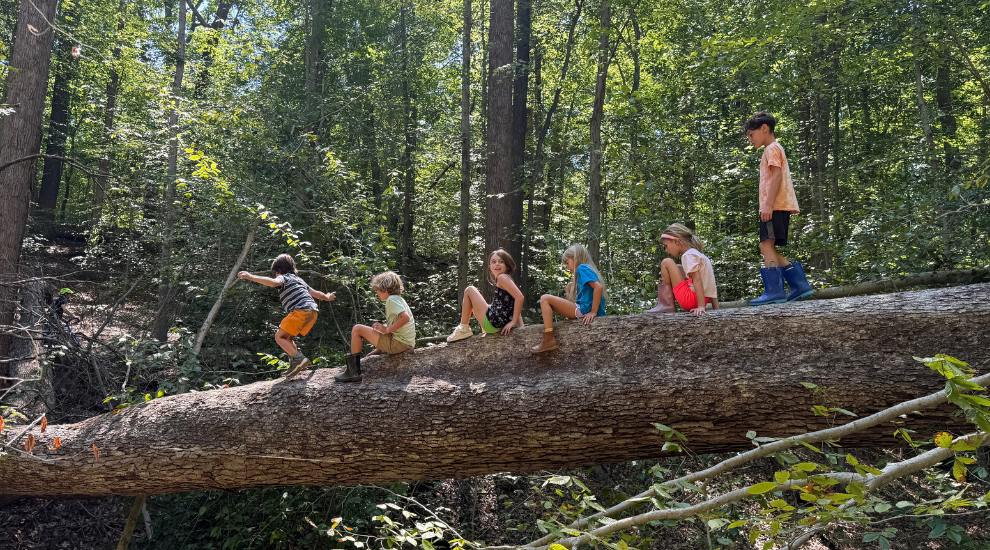Kids, the annual task of planning for summer break can begin as early as February. My daughter is in kindergarten, so this is the first year that I’ve had to think about what she’ll be doing during the ten weeks when school is out.
Truthfully, I was already starting to think about camp during the end of summer last year. Due to my work and other commitments, I knew that letting my daughter stay home all summer wasn’t an option. I got so anxious about the possibility of not having care for her that, after investigating a few daycares with school-age camp programs, I handed over a check to place her on a waiting list back in August. Yes, this was ten months in advance – and there were already fifteen people on the list!
It turns out that I really didn’t have to worry. After doing more research, I learned there were plenty of options available for different needs, interests, and budgets. And as more of our summer plans solidified, I realized that we only needed five weeks of camp after factoring in our vacations and grandparent visits (and Camp Grandma is free!). I may have jumped the gun a bit last August and sacrificed my non-refundable wait-list deposit, but hey, it’s a learning curve.
The market for summer camps is a huge one, with all types of places – churches, private schools, sports clubs, music schools, martial arts dojos, and more – offering unique experiences to attract families. In sorting through the options, here are a few things that I’ve found helpful to consider:
- Determine what camp schedule works for you.
Do you want your kids to attend a full-day or a half-day camp? Some full-day camps also offer extended hours where you can pay an additional fee to have your kids arrive earlier and/or stay later. Think about what works best for your family’s schedule and budget.
Camps also differ by session length. While many camps offer enrollment by the week, some specialty camps are single-day experiences. A mix-and-match approach that combines different camps throughout the summer would give your child the opportunity to explore a wide range of activities. However, if you crave simplicity or need a more consistent camp schedule, enrolling in multiple weeks of the same camp or a whole-summer program might be a good choice.
Alternately, if you don’t need camp as child care for the entire summer, consider some off weeks to let your kids relax with some unstructured time at home. They may appreciate the down time, especially after a busy school year, and you’ll surely appreciate it from a budget standpoint. - Consider how much your child enjoys being outdoors in the summer.
Some camps take place almost entirely outdoors. How would your kid feel about that? While camps do take measures to deal with the summer heat – such as limiting time in the sun and ensuring that campers drink plenty of water – consider whether being outdoors in the heat and humidity is something your child can tolerate.
A friend of ours sent her two daughters to a traditional outdoor adventure camp last year and said they had a fantastic time singing the camp songs and doing the activities. While I love the idea of encouraging my daughter to be more outdoorsy, I decided to let her stay in her comfort zone for her first summer of camp. Also, because she can’t swim yet, I didn’t want her to be in an environment where she might feel out of place as a non-swimmer. While most camps do have safety measures in place to identify swimmers and non-swimmers, it’s important for parents to feel comfortable with the way an outdoor adventure camp incorporates swimming into their program. - Be honest: Would your child enjoy an academic camp, or do they need a break from academics?
Many academic camps focus on STEM-related skills like coding, science, and robotics. While these camps could be a great opportunity to keep your kids learning over the summer, they’re only a good fit if everyone’s on board. Kids with rigorous coursework throughout the year might just want a break from school. And that’s completely understandable!
If you are considering an academic camp, ask about the staff’s qualifications and training. Is the program developed by education professionals? Look at the schedule for a typical camp day and determine if it’s a good fit for your child. Is there a balance between academics and recreation? - Cater to kids’ interests – but don’t be afraid to try something new.
If your kid absolutely loves something, they’ll probably want to dive into it even further during the summer. In fact, summer break might give them the time to focus on what truly excites and interests them. Whether it’s growing their skills through a sports clinic, unlocking their inner artist at an arts camp, or delving into the world of gaming, there are many camps that will let kids indulge in their unique interests.
And while it’s easy to limit your search, you might uncover some hidden gems by looking at more unconventional summer camp offerings. Consider options like cooking camp, sewing camp, film-making camp, or robotics camp. Summer camp can be a great opportunity for your child to try something new, especially if it’s only for one week. - Ask what camps others are signing up for, but view them as a could-do, not a must-do.
Talk to other parents, look at online testimonials, and scour Facebook groups for ideas. Consider what camps your child’s friends are attending, but don’t just follow the friend crowd. Make sure you’re enrolling your kid in a camp they would enjoy by themselves. Depending on how the camp is designed, it’s possible that your child and their friend who signed up for the same camp might end up not even spending that much time together. And remember, summer camps are where new friendships can be forged. - Read the fine print.
When it comes to safety, don’t be afraid to ask questions. You might want to ask whether the staffers are trained in first aid and CPR, whether they’ve undergone background checks, or if there are clear guidelines for handling food allergies. You may also want to check if the camp is accredited by the American Camp Association.
The cost of summer camp is also an important factor. There may be early-bird discounts, sibling discounts, or multi-session discounts that could make a camp more affordable. On the flip side, check the fine print for any additional fees for things like camp t-shirts, field trips, or supplies. In addition, you may want to find out the camp’s cancellation policies and what your options are if your child isn’t able to attend due to illness.
There are so many amazing camps in our area and the choices might seem overwhelming, especially if you’re considering camps for the first time. The good news is, in addition to word-of-mouth recommendations, there are online resources available, like RFM’s Summer Camp Finder at RFMonline.com. You’ll find hundreds of summer camps for kids of all ages, and you can filter and search by activity, type of camp, age range, and where the camp is located.
With the excitement of school break and the thrill of new experiences, your kids are sure to have a memorable summer no matter which camp they go to. And just remember, they’ll always have next year to try something different!





